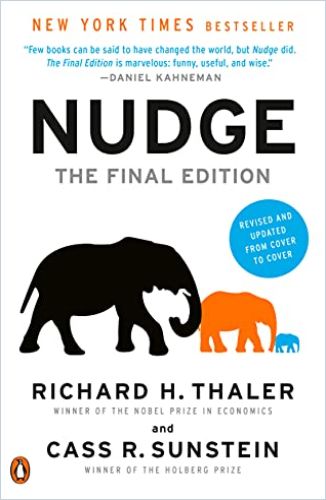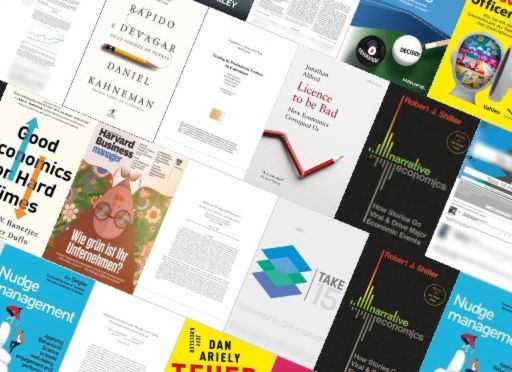Nobel Prize-winning economist Richard H. Thaler and Harvard Law professor Cass R. Sunstein take another look at people who make decisions that are not in their self-interest.

Embrace the Nudge
In this updated look at humanity’s follies, 2017 Nobel Memorial Prize in Economic Sciences winner Richard H. Thaler and Harvard Law professor Cass R. Sunstein freshen up their 2008 classic. The scholars describe common holes in human cognition and easy ways to fix problems that fall through those gaps.
Wiser Decisions
People often avoid doing things that are good for them, and they gravitate toward things that are bad for them. A “nudge” doesn’t rely on fines, taxes or other punishments. A nudge could involve making it slightly more convenient for people to make a wise choice than an unwise one.
Putting the fruit at eye level counts as a nudge. Banning junk food does not.Cass R. Sunstein, Richard H. Thaler
Everyone thinks that he or she is above average. Despite a divorce rate nearing 50%, few newlyweds believe that that fate awaits them. From the perspective of nudges, the best approach might be to remind them that not everything works out as well as they hope it will.
Another human failing is the “status quo bias.” Sometimes, the stakes are small. For example, Cass Sunstein once accepted an offer for “free” magazine subscriptions. The catch? After three months, he had to pay for the subscriptions. Sunstein didn’t get around to canceling for years, meaning he was paying for magazines he rarely read. He’d fallen victim to the natural tendency to resist change. This ethos explains why streaming viewers will simply keep watching a series as the next episode loads. The stakes are higher in investing: Many retirement savers don’t look at the details of their pension plans for decades. This leads to such oddities as married people listing their mothers as their beneficiaries.
People also go to great lengths to manage temptation. In the classic myth of Ulysses, the hero approached the lethal singing Sirens with a plan. He ordered his crew to block their ears with wax so that they couldn’t hear the Sirens’ enticing voices. And he ordered the men to tie him to the ship’s mast, so that he would not succumb to the overwhelming urge to jump overboard.
Alarm clocks, and how humans manage them, also exemplify temptation management. Some people place their clocks across the room, knowing that they’ll be less likely to turn off the alarm and go back to sleep if they have to get out of bed to silence the darned thing.
“Choice Architecture”
Humans are hardwired to mimic one another and to harshly judge those who don’t. During the coronavirus pandemic, for example, mask-wearing became common in part because everyone else wore one. College students’ grades vary widely, usually according to the study habits of their classmates and roommates.
The bottom line is that humans are easily nudged by other humans. Why? One reason is that we like to conform.Cass R. Sunstein, Richard H. Thaler
In the United Kingdom, revenue collectors mailed letters to scofflaws informing them that 90% of people pay promptly. That simple approach pried missing payments from many taxpayers. And the strategy worked even more effectively when it named the specific city in which the reluctant taxpayer lived.
Call it the golden rule of libertarian paternalism: Offer nudges that are most likely to help and least likely to inflict harm.Cass R. Sunstein, Richard H. Thaler
Choice architecture – a way of influencing consumer decisions – is part of nudging. The Paris Metro system’s card readers, for example, accept cards inserted in any direction. By contrast, Chicago parking garages require people to insert their credit cards in only one of four possible ways. This results in delays, as motorists fumble for the right approach.
Modern cars provide nudges: If you don’t buckle your seatbelt, they remind you. If your gas is getting low, you’ll see a warning. If you almost hit another vehicle, an alert will sound. If your vehicle takes diesel, a pump that dispenses regular gasoline won’t fit in your tank.
When choice is complicated and difficult, people might greatly appreciate a sensible default.Cass R. Sunstein, Richard H. Thaler
People are more likely to make choices associated with enjoyment. It’s how Mark Twain’s fictional Tom Sawyer tricked his friends into painting the fence for him. In China, tax collectors countered tax avoidance on cash transactions by printing scratch-off lottery tickets on receipts. Consumers began requesting receipts – and more cash transactions entered the formal tax system.
Insurance and Retirement
Property owners routinely lose big money by not buying flood insurance. Homeowners should accept the risk of higher deductibles on their property insurance. Most people never file claims and save money in the long run by opting for lower coverage in exchange for lower premiums.
The general principle that underlies our advice about deductibles is that you want to ‘self-insure’ as many risks as possible.Cass R. Sunstein, Richard H. Thaler
Health insurance presents an especially tricky calculus. Many people can’t judge the relationship between lower deductibles and higher overall costs. And when consumers face many choices, their decisions grow more difficult. One employer offered employees a “salad bar” of health insurance options, which led to nearly 50 possible arrangements of deductibles, copayments and other variables. The employer found that workers made illogical decisions about deductibles. For instance, one plan offered a deductible of $1,000 and an annual premium of $930. Another offered a deductible of $500 and a premium of $1,568. The second option was a poor deal: Employees paid an extra $638 to reduce their deductible by $500. People like lower deductibles, even if they don’t make economic sense.
In the annals of human history, retirement planning is a relatively new task. Only recently have people lived long enough to think about saving for retirement. Under the US Social Security system, beneficiaries don’t need to do anything other than show up for work and continue working long enough to qualify for benefits.
Saving for retirement is one of the hardest tasks humans face.Cass R. Sunstein, Richard H. Thaler
Some employers’ defined-contribution plans encourage workers to participate by matching their contributions, perhaps offering 50% of the first 5% or 6% contributed by the employee. Despite this free money, many people don’t bother to contribute. Clearly, they need a nudge.
Not Me
Readers may shake their heads at the relentless avalanche of idiotic decisions their peers make regarding love, money, health, driving, insurance and magazine subscriptions. But scholars Cass R. Sunstein and Richard H. Thaler lean on one simple theme: Everyone makes these mistakes –everyone. This is not a self-help book; the authors won’t teach you how to close the holes in your head. Instead, they provide example after example of individuals behaving foolishly, by which the authors mean, like human beings. While these examples clearly entertain the authors, Sunstein and Thaler offer them as cautionary tales in an altruistic guide that almost believes that people can get out of their own ways.







